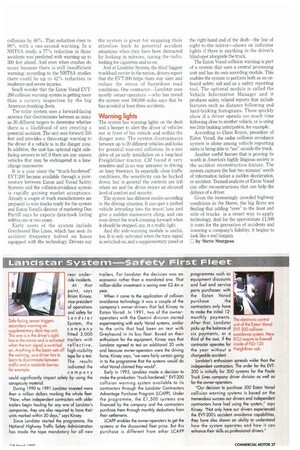rear underride incidents.
Page 39

If you've noticed an error in this article please click here to report it so we can fix it.
At that point, says Brian Kinsey, vice-president of operations and safety for Landstar System, the company fitted 3,000 trailers with reflective, high-visibility tape for a test. The results indicated the company could significantly impact safety by using the conspicuity material
During 1990 to 1991 Landstar invested more than a million dollars marking the whole fleet. "Now, when independent contractors with older trailers begin hauling for any one of Landstar's companies, they are also required to have their units marked within 30 days," says Kinsey.
Since Landstar started the programme, the National Highway Traffic Safety Administration has made the tape mandatory for all new trailers. For Landstar the decision was an economic rather than a mandated one. That million-dollar investment is saving over £2.4m a year.
When it came to the application of collision avoidance technology it was a couple of the company's owner-drivers that led Kinsey to Eaton Vorad In 1991, two of the owneroperators with the Gemini division started experimenting with early Vorad systems, similar to the units that had been on test with Greyhound in its bus fleet. Based on their enthusiasm for the equipment, Kinsey says that Landstar agreed to test an additional 20 units and because owner-operators were the driving force, Kinsey says, "we were fairly certain going in to the programme that the systems would do what Vorad claimed they would".
Early in 1993, Landstar made a decision to make the production "truck-hardened," EVT-200 collision warning system available to its contractors through the Landstar Contractors Advantage Purchase Program {LCAPP), Under the programme, the £1,500 systems are financed by the company and the contractors purchase them through monthly deductions from their settlements.
LCAPP enables the owner-operators to get the systems at the discounted fleet price. But this purchase is different from other LCAPP programmes such as equipment discounts and fuel and service parts purchases: with the Eaton Vorad purchase the contractors only have to make the initial 12monthly payments. After that, Landstar picks up the balance of six payments, or a third of the cost, if the contractor operates for the year without a chargeable accident.
Landstar's enthusiasm spreads wider than the independent contractors. The order for the EVT200 is initially for 500 systems for the Poole Truck Lines company driver division as well as For the owner-operators.
"Our decision to purchase 500 Eaton Vorad collision warning systems is based on the tremendous success our drivers and independent contractors have had using the system," says Kinsey. "Not only have our drivers experienced the EVT-200's accident avoidance capabilities, they have also shown an ability to understand how the system operates and how it can enhance their skills as professional drivers."




























































































